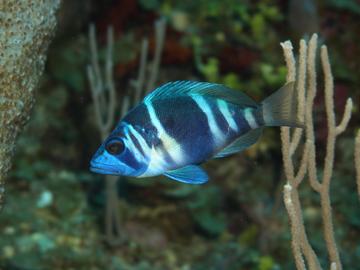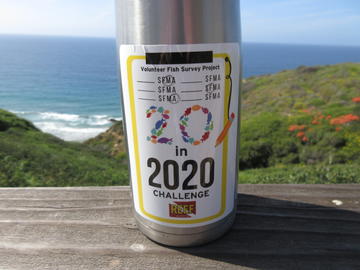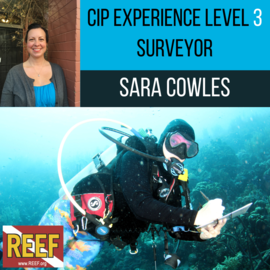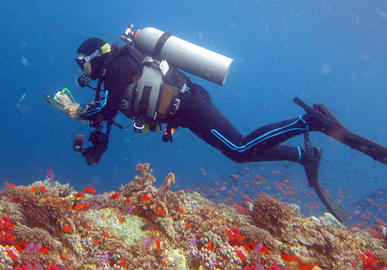Are your gills drying out in self-quarantine? Grab your laptop, tablet, or even a smartphone and join us for our next Fishinar, Fishes of Guanaja, on Thursday, April 16 at 8:00pm EDT! Instructor Janna Nichols will teach you tricks to identify the fishes of deep walls and tranquil gardens of Guanaja, located in the Bay Islands of Honduras - part of our Tropical Western Atlantic survey region. Fishinars are free webinars that will teach you the finer points of fish ID.
Twenty-seven surveyors have met our 20 in 2020 Challenge by conducting and submitting at least 20 surveys this year. The challenge is ongoing throughout 2020 and there's still plenty of time to join in. Everyone who completes the challenge gets a special decal and is entered into a drawing for a prize! You can check out more details on the webpage here.
Have you conducted and submitted 20 surveys in 2020? If so, email 202020@REEF.org and let us know!
These REEF members are moving up in the world! This past month we've had a number of Experience Level advancements by folks who have been busy conducting surveys and learning how to identify fish. This list includes people from:
A new species of shrimpgoby was discovered by active REEF surveyor, Janet Eyre, while conducting REEF surveys in the Misool area of Raja Ampat in January 2019. Janet then communicated with authors, providing images and an exact location of where the fish was sighted, enabling the collection of type specimens. The new species was described and named after Janet - Janet's Shrimpgoby (Tomiyamichthys eyreae).
We are excited to announce that the REEF Volunteer Fish Survey Project database topped 200,000 earlier this fall. The survey was conducted by active surveyor, Kreg Martin, during a survey Cape Kri in Dampier Strait, Indonesia, on 10/15/ 2015.
Here's Kreg's story of getting involved with REEF in the tropical Pacific and the lucky 200,000 survey:
In this early paper, staff from REEF and NOAA studied feeding ecology of the invasive lionfish (Pterois volitans). The authors collected stomach content data from fishes taken throughout the Bahamian archipelago. Three relative metrics of prey quantity, including percent number, percent frequency, and percent volume, were used to compare three indices of dietary importance. Lionfish largely prey upon teleosts (78% volume) and crustaceans (14% volume).
Culling can be an effective management tool for reducing populations of invasive species to levels that minimize ecological effects. However, culling is labour-intensive, costly, and may have unintended ecological consequences. In the Caribbean, culling is widely used to control invasive Indo-Pacific lionfish, Pterois volitans and P. miles, but the effectiveness of infrequent culling in terms of reducing lionfish abundance and halting native prey decline is unclear.
Through the analysis of acoustic recordings of captive Pterois spp., this study has confirmed anecdotal evidence that Pterois spp. are soniferous. This report of sound production in Pterois spp. provides the foundation for future research into their specific acoustic capabilities including sound production mechanisms, the role of social behaviour and applied techniques for controlling and monitoring invasive Pterois spp. in the tropical and temperate western Atlantic Ocean. REEF staff, Lad Akins, was a co-author.
The authors evaluated Goliath Grouper’s use of mangroves as essential nursery habitat by estimating absolute abundance, density, survival, age structure, home range, mangrove habitat association, habitat quality, and recruitment to the adult population. REEF Volunteer Fish Survey Project data from 1993 to 2004 collected in Florida were used to determine sighting frequency of Goliath Grouper.
REEF Volunteer Fish Survey Project data were used in this publication to help elucidate annual mean abundance in Goliath Grouper at sites off the southeastern coast of Florida. The authors further used the data to look for probable spawning sites. The data showed the buildup of the Goliath Grouper population in the spawning area off SE Florida over time. However, there was insufficent survey effort to demonstrate a pattern off SW Florida.




